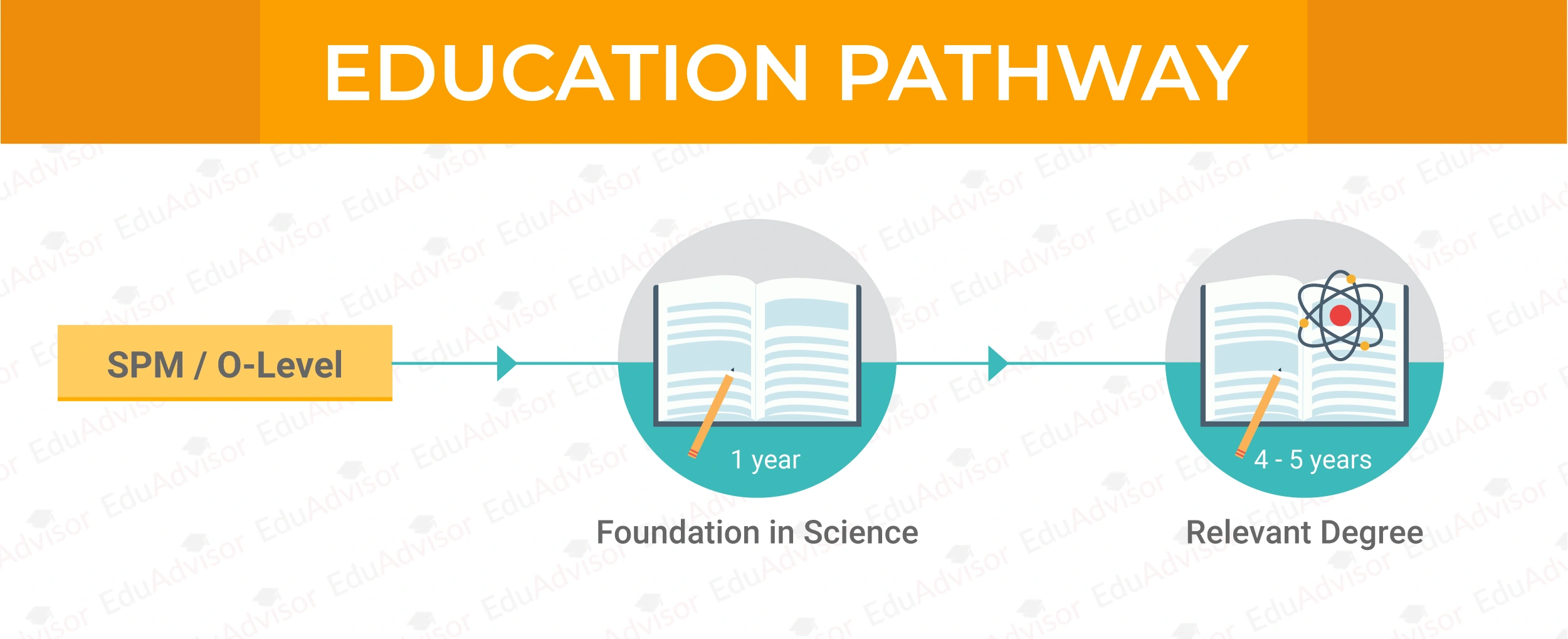The Complete Guide to Studying Foundation in Science in Malaysia
What's the entry requirement to study Foundation in Science? Explore subjects, top degrees and universities you can pursue with Foundation in Science in Malaysia.

A Foundation in Science is one of the best university preparatory programmes if you’ve already decided to pursue a science-related degree.
But what do you learn in Foundation in Science? What is its advantage over other courses, such as A Levels, Australian Matriculation and STPM?
This guide will answer all your questions about studying a science foundation course in Malaysia. Find out what are the requirements, what subjects you will learn and which are the best universities for a Foundation in Science programme.
Ready to pursue your passion for science? Read on for all the info you need!

Taylor's College
Foundation in Science
✓Modules and projects that develop critical thinking through exploration of new methods as well as professional mentorship, assessment and exposure
#1. What is Foundation in Science
 A Foundation in Science is a university preparatory programme that concentrates on subjects related to science (e.g. physics, chemistry, biology), mathematics and information technology. It prepares you for a smooth transition from SPM to a wide range of science-related degrees such as medicine, engineering, bioscience and computer science.
A Foundation in Science is a university preparatory programme that concentrates on subjects related to science (e.g. physics, chemistry, biology), mathematics and information technology. It prepares you for a smooth transition from SPM to a wide range of science-related degrees such as medicine, engineering, bioscience and computer science.
As a Foundation in Science is specifically developed by the university, completing this programme will equip you with strong fundamental knowledge and skills to pursue a science-related degree at the same university.
a) What subjects are needed for Foundation in Science?
To study Foundation in Science, you must have studied these subjects for SPM or equivalent:
- Mathematics
- 2 Science subjects (Chemistry / Biology / Physics)
- English
- Additional Mathematics (required by some universities)
b) Foundation in Science Requirements
These are the general entry requirements for a Foundation in Science:
- SPM (or equivalent): Minimum 5Cs including Mathematics and 2 Science subjects
Depending on the degree you choose to pursue after your foundation study, you may also have to meet these additional requirements:
- For entry into Medicine, Dentistry, Pharmacy or Allied Health Science programmes: Minimum 5Bs including Biology, Chemistry, Physics, Mathematics (or Additional Mathematics) and 1 other subjects at SPM level
- For entry into Engineering programmes: Minimum 5Cs including Mathematics and Physics at SPM level
- For entry into Architecture programmes: Minimum 5Cs including Mathematics at SPM level
c) How long is a Foundation in Science course?
A Foundation in Science programme is typically about 12 months long.
d) How much does it cost to study Foundation in Science in Malaysia?
A Foundation in Science programme can cost from RM500 to RM30,000.
#2. How Is Foundation in Science Structured?

Most Foundation in Science courses have a curriculum that is somewhere between broad-based and specialised — offering a good introduction to a subject — but provides enough depth at the same time. Course modules typically revolve around sciences, mathematics, computing and engineering subjects. Typically, you will be required to take some compulsory core subjects, with the option to choose several elective subjects that are related to your degree.
You will be assessed through a healthy combination of coursework and final exams. Continuous assessment in the form of quizzes, practical tests, presentations and projects make up 30%–50% of your grade, while final exams are between 50%–70%.
One important point to note about a Foundation in Science is that the programme is administered by the university itself, unlike other pre-university courses that are managed by a central body (e.g. A Levels is administered by Cambridge, SACE International is administered by the SACE Board of South Australia).
This means that the syllabus of a Foundation in Science in one university may not be the same as one from another university. In contrast, the syllabus for A Levels is the same across Malaysia, regardless of which college you pursue the course in.

#3. What Do You Study in Foundation in Science?
Here are some of the typical Foundation in Science subjects you can expect to study:
- Mathematics (e.g. Algebra, Calculus, Mathematics for Science)
- Chemistry (e.g. General Chemistry, Principles of Chemistry)
- Physics (e.g. Fundamentals of Physics)
- Biology (e.g. General Biology)
- English
- Computing Essentials
The university may also offer more focused modules that are specific to your intended degree. Here are some example subjects.
Health Science (e.g. medicine, pharmacy)
- Molecules, Cells and Energy
- Thermochemistry and Organic Chemistry
- Introduction to Medical Sciences
- Psychology in Healthcare
Engineering
- Engineering Mathematics
- Electromagnetism and Thermodynamics
- Introduction to Engineering Technology
- Engineering Design and Innovation
Computing
- Introduction to Computing Mathematics
- Introduction to Algorithm & Problem Solving
- Introduction to Multimedia

Taylor's College
Foundation in Science
✓Modules and projects that develop critical thinking through exploration of new methods as well as professional mentorship, assessment and exposure
#4. Your Education Pathway With a Foundation in Science

The Foundation in Science is a great option for those seeking a career in the science and STEM fields. Here’s how your education pathway will look like.
Step 1: First, complete a Foundation in Science after SPM. This will typically take 1 year.
Step 2: Afterwards, you can immediately enrol into a science or STEM-related undergraduate degree such as Medicine, Pharmacy, Computer Science and Engineering. The duration varies from one degree to the next but you’re generally looking at 4 – 5 years of study.

#5. Why Should You Take Foundation in Science?

There are plenty of reasons why you should choose a foundation course. Here are a few of the top reasons:
a) It gives you a head start on your degree
A Foundation in Science programme prepares you for the basics of your chosen field, emphasising on specialised subjects and modules that will prepare you for your science degree. Many universities offer both core and elective subjects, so you can explore different topics during this preparatory year.
b) It gives you a smooth transition towards your degree
Since a Foundation in Science is geared towards science degrees that are offered at the same university, you will be able to transition easily into your degree programme. At the same time, you’ll also be more familiar with the university environment and the method of teaching.
c) It is one of the quickest paths to enter a science-related degree
Most Foundation in Science courses are about 12 months long, which is a faster route to enter university compared to taking A Levels or STPM.
d) Some universities offer better scholarships and have more affordable fees
Compared to A Levels or Australian Matriculation, you may find that some universities offer more generous scholarships for their foundation courses. You may even get a discount for both your foundation and degree with your SPM results. They are also usually cheaper than other pre-university courses at the same institution.

Taylor's College
Foundation in Science
✓Modules and projects that develop critical thinking through exploration of new methods as well as professional mentorship, assessment and exposure
#6. Is Foundation in Science Right For You?
 If you’re wondering whether you should study Foundation in Science, here are some questions to think about:
If you’re wondering whether you should study Foundation in Science, here are some questions to think about:
- Are you good at maths and science subjects?
- Are you confident that you want to pursue a science-related degree?
- Are you planning to pursue your degree studies at the same institution?
- Do you want to get a head start on learning the subjects related to your degree of interest?
- Do you want to accelerate your pathway to enter university?
If you’ve answered 'yes' to most of these questions, Foundation in Science may be right for you.
Remember that Foundation in Science courses are usually recognised by selected universities only, so make sure you do your research! You don’t want to be in a position where other universities do not recognise your foundation qualification and end up being stuck at a university that doesn’t offer your choice of degree.
#7. Frequently Asked Questions About Foundation in Science
a) Can you switch universities after completing a Foundation in Science?
This depends.
Unlike A Levels or Australian Matriculation that have a standardised curriculum, foundation programmes are administered by the universities themselves. This means different universities may offer different subjects and syllabus for the same type of foundation. As the foundation programmes acts as a transition to the degree courses, most students will typically further their degrees at the same institution or partner universities.
That being said, you can still switch universities after completing your Foundation in Science should the “receiving” university accepts your qualification. However, it is always recommended to select a college or university that offers both the foundation and your degree of interest.
PRO TIP
Some universities have links with various partner universities (locally and abroad) for their Foundation programmes, which gives you more options and allows for easy switching.
b) Can you switch to a non-science degree?
This is subject to the university’s assessment. Usually, students with a science background can easily switch to non-science degrees such as business, mass communication or hospitality and tourism.
If you are switching universities and changing streams, you may be required to take additional subjects or credit hours.
#8. Best Foundation in Science in Malaysia
If you are interested to take up a Foundation in Science, then check out some of the best universities for Foundation in Science in Malaysia. Alternatively, compare more universities for Foundation in Science here.
Taylor's College
Subang Jaya, Selangor
Intake
Feb, Apr, Jul*, Aug
Tuition Fees
RM29,850
A pioneer in pre-university education









